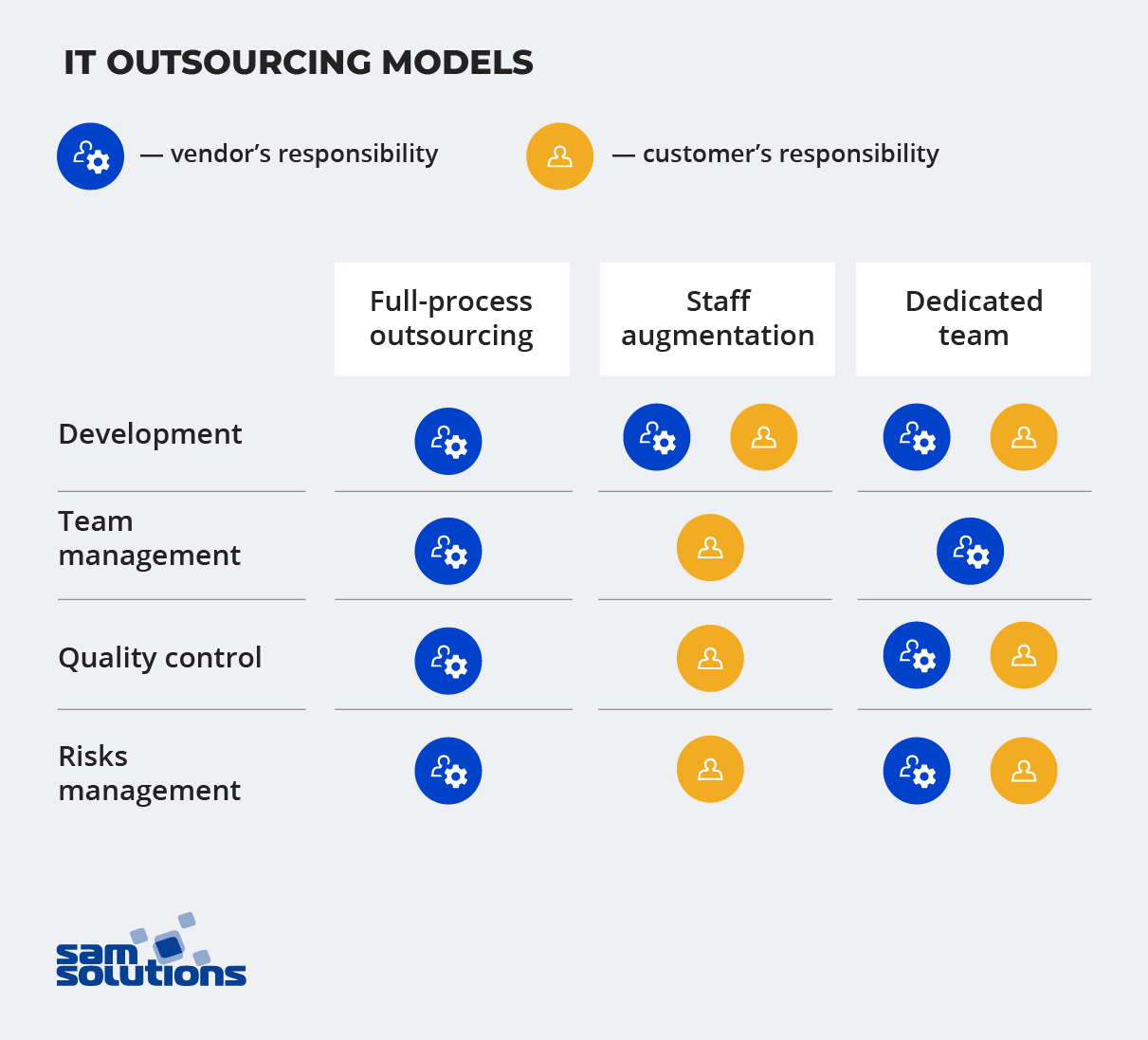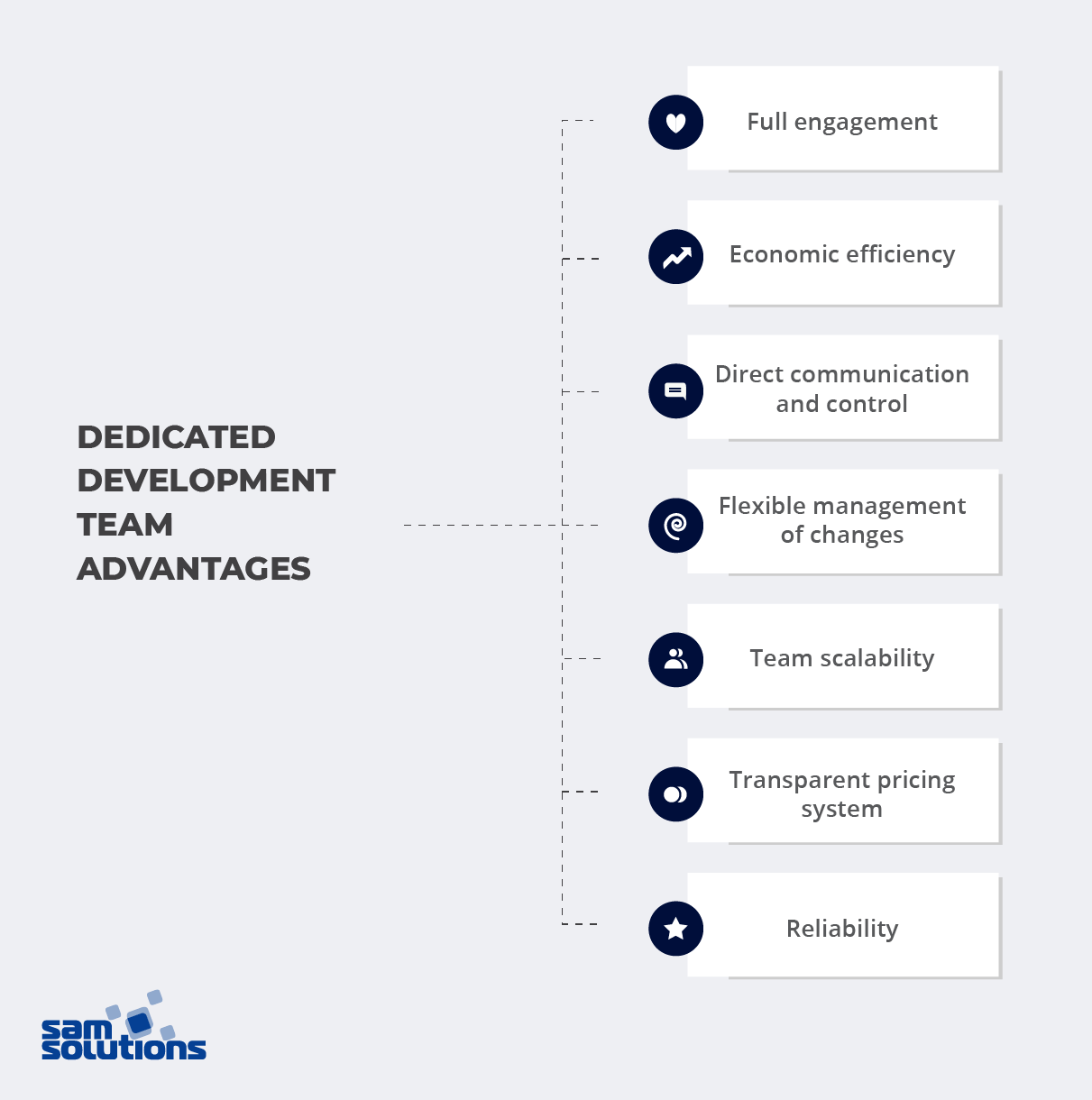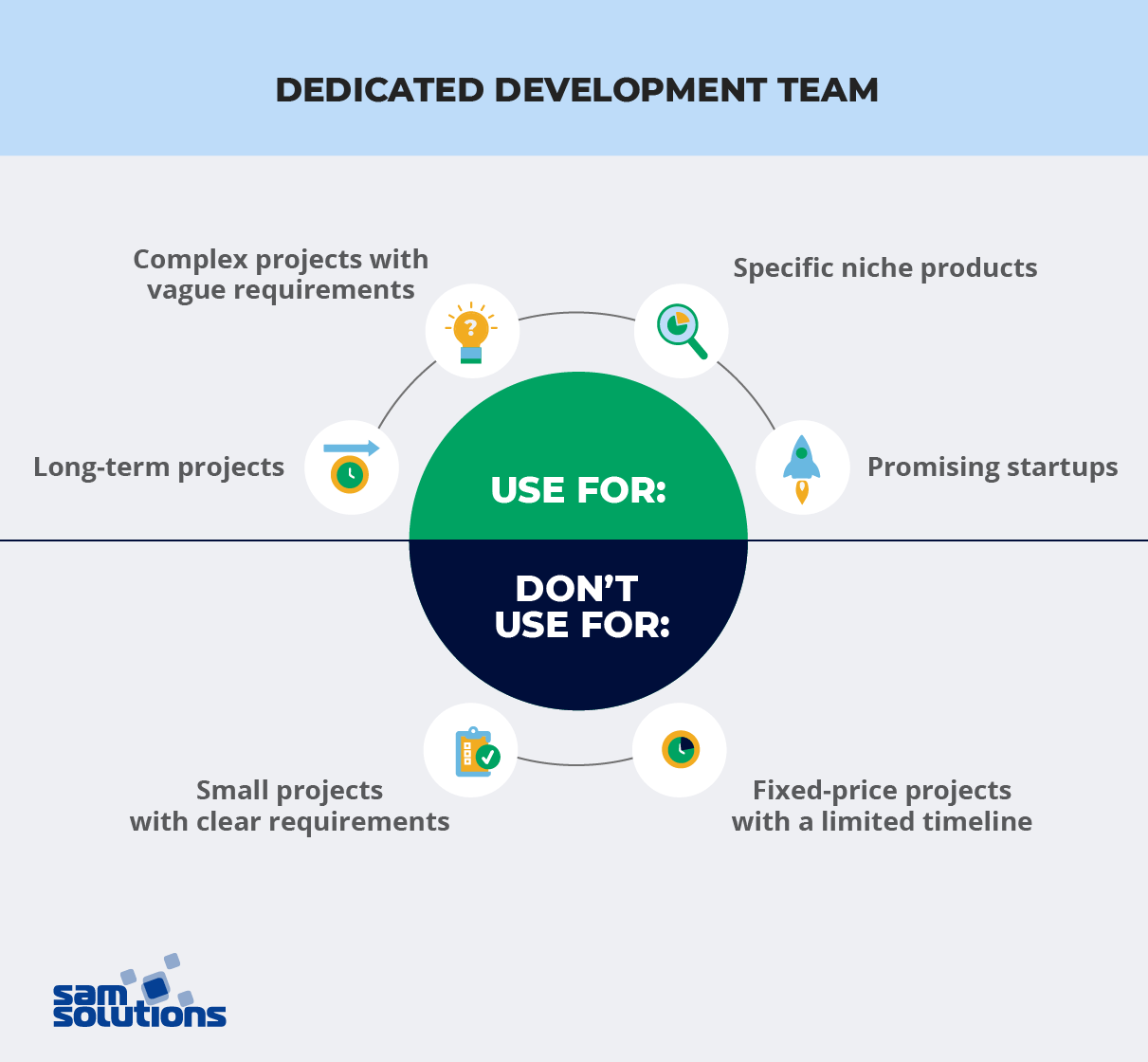Many organizations today have to use digital solutions. But not many of them can afford to hire an in-house team of technical specialists to fully develop and maintain such solutions. In most cases, it’s more reasonable to turn to IT outsourcing companies.
This article provides a detailed look at a popular IT outsourcing model — the dedicated development team. You’ll learn how this model works, when you may need it, and what benefits it brings.
Develop your custom software with SaM Solutions’ engineers, skilled in the latest tech and well-versed in multiple industries.
Types of Remote Software Development Teams
The success of digital business projects depends on the work of developers and other IT specialists. Based on the project goals, features and scale, as well as financial capabilities, the company should choose the most appropriate collaboration model to interact with its IT contractor.

There are three basic IT outsourcing models.
- Full-process outsourcing — when the development process is entirely under the vendor’s control, including development, team management, quality control and risk management stages; the client has minimum involvement.
- Staff augmentation — when the client has in-house specialists but needs specific experts to complement the team; the vendor provides the specialists who are responsible for the development stage only; this outsourcing model ensures seamless team scalability.
- Dedicated team — when a vendor provides an entire group of IT specialists (developers, business analysts, UI/UX designers, QA specialists, PMs) aimed to create a specific project in collaboration with the client’s experts; team management is on the vendor’s side, and other responsibilities are shared between the client and the provider.
What Is the Dedicated Team Model?
Now, let’s focus on the dedicated team.
Definition
A dedicated development team is an outsourcing model for joining forces of the client’s in-house specialists with a purposefully assembled remote team, with the aim of achieving specified business goals. The term “dedicated” reflects the essence of this model: members of a dedicated team model are selected according to customer wishes and requirements, as they will be engaged only in this project.
Peculiarities
- No full integration. A dedicated team doesn’t get fully integrated into the client’s team (unlike the staff augmentation model); it works independently.
- Long-term collaboration. This model is great for developing large, long-term projects where requirements change frequently. A dedicated team works on the project full-time and the client can directly communicate with each team member; consequently, there is enough flexibility regarding the scope of work, tasks, costs and resources, as well as the development team itself. In fact, the software provider acts more like a reliable partner than a temporary service provider.
- A deeper understanding of your business. Specialists in a dedicated team model dive deeper into your business since they are not distracted by other projects. They can better understand the way the processes work and what the ultimate goals are, and focus more on the results.
- Shared responsibilities. Team management is the vendor’s responsibility with this model, while other responsibilities and risks are shared between the two parties.
Structure
This model involves much broader partnerships than just staff augmentation. It encompasses a wide range of software-related services such as business analysis, UI/UX design, quality assurance, project management, maintenance and support.
Hence, a dedicated development team consists of the following members:
- Project managers (PMs)
- Business analysts
- Frontend and backend software developers
- UI/UX designers
- Quality assurance (QA) engineers
Other experts such as DevOps engineers, data scientists, architects, or consultants can be added on request.
Advantages of a Dedicated Development Team
All the advantages of a dedicated model are better revealed in long-lasting and complex projects. Take a look at the main reasons to choose this model.

1. Full Engagement
When working long-term on a single project, team members are deeply involved in the development process, and better understand project requirements. Hence, their incentive to achieve the best possible result is higher.
2. Economic Efficiency
By hiring a dedicated team, customers significantly save on infrastructure: they only need to pay an hourly rate to remote employees and don’t have to worry about renting an office, purchasing equipment, paying electricity bills, etc. Moreover, hiring an already well-coordinated team is much quicker and cheaper than independently searching for developers with the required skills.
3. Direct Communication and Control
According to this model, the customer participates in the hiring process, directly communicates with each team member, distributes and schedules tasks, receives regular reports on completed tasks and provides feedback. These options make the development process transparent and well-managed, improve employee productivity and lead to desired results.
4. Flexible Management of Changes
With dedicated development, the client can request changes to the project at any stage, and they will be implemented. This is a typical situation for long-term comprehensive solutions when it’s impossible to identify all the requirements and product functions from the very beginning.
5. Team Scalability
The customer can decide how many people to hire for the project. In the course of development, the customer can add members, if needed, or reduce the team.
6. Transparent Pricing System
Each month, the client pays a fixed monthly salary to all team members, so the total project cost depends on the size of the team and the time needed to complete it.
7. Reliability
Dedicated development is considered to be the most reliable outsourcing model. Such a team is like a well-coordinated organism that is inspired by your goals, follows your directions, and will not leave you halfway if something goes wrong. Ensured transparency and flexibility also help avoid numerous risks or issues during software development.
Dedicated vs. In-House Development Team: Which Is Better?
There is no definite answer for all companies because each company has a unique set of opportunities, purposes and circumstances.
On the one hand, it’s great to have in-house IT specialists who are devoted to your business and available at any time. On the other, companies with in-house staff often lack tech experts with specific expertise for particular projects.
Finding and hiring such experts by yourself is of course possible, but keep in mind that the process is costly, time-consuming and resource-intensive.
On the other hand, hiring a dedicated team may be a good idea because you:
- quickly get access to the IT expertise you need
- save money
- get a high-quality result.
It’s inappropriate to compare in-house and dedicated team models; you should always make a choice judging by your needs and opportunities.
How to Build a Dedicated Development Team
The ultimate goal of building a dedicated development team is to find and bring together people with the right skills who will contribute to your project’s success. A dedicated team is built from scratch, and the following is the guide on how you can do this.
Step 1. Defining Requirements
Starting out from your business idea, you should define your requirements for the project. Keep in mind that changes will be inevitable during the development, but the skeleton should be clearly defined in advance, i.e.:
- the type of solution you need (web, desktop, mobile, etc.)
- the problem this solution should address
- the timeline.
This information will help the vendor outline the future functionality, decide on the tech stack, and understand the scope of work and what specialists are needed.
Step 2. Interviewing Candidates
A software provider selects candidates for each needed position and conducts interviews. The client can be involved in interviewing, which is an excellent opportunity to clarify expectations on the project goals and each member’s role and duties.
In addition, participation in the hiring process allows the client to choose candidates who will be a perfect fit not only because of their experience and technical proficiency but also because of their soft skills and how well they fit in with the company culture.
Step 3. Managing the Team
As soon as you’ve collected a dedicated team, you should launch the development process and support its seamless flow along the way. At this point, your involvement and communication are key to success:
- Conduct regular online meetings
- Encourage employees to ask questions
- Share your feedback on the progress
- Maintain constant communication with the vendor’s project manager
Sometimes, it can be a good idea to organize an offline meeting with the team to build personal contact. The reputation of a client who can always listen and hear positively affects the outcome.
Step 4. Showing Appreciation
When the job is done, congratulate the team and say thank you to each member. Thus, you’ll show respect and gratitude and will motivate these specialists to work with your company on any future projects.
Before You Hire a Dedicated Team
There are some essential issues you should pay special attention to before hiring a dedicated team.
- Distribution of responsibilities. You should clearly understand the future development process and figure out in advance who will be responsible for what in order to avoid conflicts at crucial moments during the project.
- Drawing up a contract. The contract must contain detailed descriptions of the team itself, responsibilities of both parties, the delivery and acceptance procedure, the cost and payment order, confidential information, force-majeure circumstances.
- NDA. You should always sign a non-disclosure agreement when hiring external experts to protect your critical data. If possible, sign an NDA with each hired specialist individually.
Our Expertise in Remote Development
SaM Solutions has been working in the IT outsourcing market for over 30 years. We’ve accumulated solid experience in various industries, including eCommerce, automotive, telecom, logistics and more. This has helped us gain a reputation as a reliable partner over the years.
We are specialists in remote development and, depending on your needs, can offer you all types of outsourcing models: full-process, staff augmentation, dedicated. With SaM Solutions, you’ll get the required number of developers, designers, project managers and testers at a reasonable price.
Is the Dedicated Team the Right Approach for Your Business?
We’ve described the obvious advantages of a dedicated team model. However, this is not a one-size-fits-all approach, and you should figure out whether it’s appropriate for your business or not. Here are some quick tips.

A dedicated team is a good choice for long-term projects, complex projects with vague requirements, specific niche products, and promising startups.
A dedicated team is not appropriate for small projects with clear requirements, or fixed-price projects with a limited timeline.
With that in mind, you can decide for yourself whether you need this collaboration model. If you are still in doubt, don’t hesitate to contact us and we’ll choose the best approach according to your requirements.



















 The Latest 15 Information Technology Trends in 2024
The Latest 15 Information Technology Trends in 2024 Top 10 Embedded Software Development Tools
Top 10 Embedded Software Development Tools IaaS vs. PaaS vs. SaaS: What’s the Difference?
IaaS vs. PaaS vs. SaaS: What’s the Difference? 10 Examples of Predictive Analytics
10 Examples of Predictive Analytics
![Web App Development Cost in 2025 [Key Price Factors]](https://www.sam-solutions.com/blog/wp-content/uploads/fly-images/31797/Web-App-Development-Cost-cover@2x-370x238.webp)











 Web App Development Cost in 2025 [Key Price Factors]
Web App Development Cost in 2025 [Key Price Factors] 13 Best React Development Tools in 2025
13 Best React Development Tools in 2025 Top 10 Mobile App Development Trends 2025
Top 10 Mobile App Development Trends 2025 Top IoT Industry Trends in 2025
Top IoT Industry Trends in 2025 Java Web App Security: Everything You Need to Know
Java Web App Security: Everything You Need to Know
To succeed from hiring an external team, you need to find a really experienced and reliable software provider. SaM Solutions seem to be such a provider, judging by your cases studies and expertise. I like your blog, thanks for the interesting content.
For me, the biggest advantage of a dedicated team is that it can be scaled up and down during the development process. It’s especially important for projects that imply many changes along the way.
Thank you for this clear explanation, we are currently in search of an outsourcing software development provider and have doubts about which collaboration model to choose. Your article helped a lot.
We often need extra software development specialists while creating complex solutions, and hiring a dedicated team is the best way out. It’s also true that dedicated teams have a higher level of engagement in the project, that’s why the result is always great.
If you decide to hire dedicated developers, you get access to unique IT expertise that you could hardly find by yourself. It’s something worth considering.
Many large global companies, including Oracle and Apple, leverage dedicated teams for their projects. And this is crucial evidence that such a model is beneficial.
I should say that a dedicated team is a really convenient outsourcing model. We successfully implemented some large projects with the help of such specialists and were happy with the results.